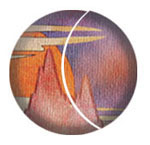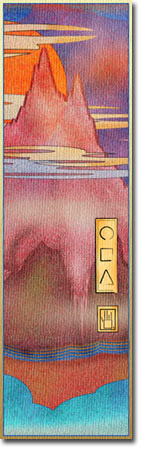On The Way: The Daily Zen Journal
Transmission of Mind -Questions from the Wan Ling Record – Part 10
Huang po (d.850)
Question: At the moment of Enlightenment, where is the Buddha?
Answer: Whence does your question come? Whence does your consciousness arise? When speech is silenced, all movement stilled, every sight and sound vanished—then is the Buddha’s work of deliverance truly going forward! Then, where will you seek the Buddha?
You cannot place a head upon your head, or lips upon your lips; rather, you should just refrain from every kind of dualistic distinction. Hills are hills. Water is water. Monks are monks. Laypeople are laypeople. But these mountains, these rivers, the whole world itself, together with sun, moon, and stars—not one of them exists outside your minds!
Outside Mind, there is nothing. The green hills which everywhere meet your gaze and that void sky that you see glistening above the earth—not a hairsbreadth of any of them exists outside the concepts you have formed for yourself! So it is that every single sight and sound is but the Buddha’s Eye of Wisdom.
Phenomena do not arise independently but rely upon environment. And it is their appearing as objects that necessitates all sorts of individualized knowledge. You may talk the whole day through, yet what has been said? You may listen from dawn till dusk, yet what will you have heard? Thus, though Gautama Buddha preached for forty-nine years, in truth, no word was spoken.
Question: Assuming all this is so, what particular state is connoted by the word Bodhi?
Answer: Bodhi is no state. The Buddha did not attain to it. Sentient beings do not lack it. It cannot be reached with the body nor sought with the mind. All sentient beings are already of one form with Bodhi.
Question: But how does one “Attain to the Bodhi-Mind?”
Answer: Bodhi is not something to be attained. If, at this very moment, you could convince yourselves of its unattainability, being certain indeed that nothing at all can ever be attained, you would already be Bodhi-minded. Since Bodhi is not a state, it is nothing for you to attain.
And therefore, it is written of Gautama Buddha: “While I was yet in the realm of Dipamkara Buddha, there was not a grain of anything to be attained by me. It was then that Dipamkara Buddha made his prophecy that I, too, should become a Buddha.”
If you know positively that all sentient beings are already one with Bodhi, you will cease thinking of Bodhi as something to be attained. You may recently have heard others talking about this “attaining the Bodhi-Mind,” but this may be called an intellectual way of driving the Buddha away!
By following this method, you only appear to achieve Buddhahood; if you were to spend eon upon eon in that way, you would only achieve Sambogakaya and Nirmanankaya. (i.e. you would achieve the physical and spiritual aspects of a Buddha, which an Enlightened One bears within various realms of transitory existence, but you would lack the Dharmakaya, the aspect of a Buddha as identical with the Absolute.) What connection would all that have with your original and real Buddha-Nature? Therefore, it is written: “Seeking outside for a Buddha possessed of form has nothing to do with you.”
Question: If we have always been one with the Buddha Absolute, why are there nevertheless beings who come into existence through the four kinds of birth and enter the six states of existence, each with the characteristic form and appearance of its kind?
Answer: The essential Buddha-Substance is a perfect whole, without superfluity or lack. It permeates the six states of existence and yet is everywhere perfectly whole. Thus, every single one of the myriads of phenomena in the universe is the Buddha.
This substance may be likened to a quantity of quicksilver which, being scattered in all directions, everywhere re-forms into perfect wholes. When undispersed, it is of one piece, the one comprising the whole and the whole comprising the one.
The various forms and appearances, on the other hand, may be likened to dwellings. Just as  one abandons a stable in favor of a house, so one exchanges a physical body for a heavenly body, and so on up the planes of Prateyaka-Buddhas, Bodhisattvas, and Buddhas. But all alike are things sought by you or abandoned by you; hence the differences between them. How is it possible that the original and essential nature of the universe should be subject to this differentiation?
one abandons a stable in favor of a house, so one exchanges a physical body for a heavenly body, and so on up the planes of Prateyaka-Buddhas, Bodhisattvas, and Buddhas. But all alike are things sought by you or abandoned by you; hence the differences between them. How is it possible that the original and essential nature of the universe should be subject to this differentiation?
Question: How do the Buddhas, out of their vast mercy and compassion, preach the Dharma to sentient beings?
Answer: We speak of their mercy and compassion as vast just because it is beyond causality and therefore infinite. By mercy is really meant not conceiving of a Buddha to be enlightened, while compassion really means not conceiving of sentient beings to be delivered.
In reality, their Dharma is neither preached in words nor otherwise signified; and those who listen neither hear nor attain. It is as though an imaginary teacher had preached to imaginary people.
As regards all these dharmas (teachings), if, for the sake of the Way, I speak to you from my deeper knowledge and lead you forward, you will certainly be able to understand what I say; and as to mercy and compassion, if for your sake I take to thinking things out and studying other people’s concepts—in neither case will you have reached a true perception of the real nature of your own Mind from within yourselves. So, in the end, these things will be of no help at all.
Huang po (d.850)
Excerpted from The Zen Teaching of Huang Po-On the Transmission of Mind-Translated by John Blofeld 1958





“… just refrain from every kind of dualistic distinction. Hills are hills. Water is water. Monks are monks. Laypeople are laypeople. But these mountains, these rivers, the whole world itself, together with sun, moon, and stars—not one of them exists outside your minds!”
The ability to stay focused on a train of thought, a task that takes days to complete, or a conversation that goes beyond things right in front of us is becoming a lost art in our times. In our fascination with quick clicks online and almost instant gratification, we need to remember that deep thinking and contemplation take more from us, a kind of slowing down into the present that requires time, emptying ourselves of conditioning, and a sharp softness, a blending of qualities that takes spaciousness and commitment.
We are so quick to assume we understand, which leaves us unquestioning in many areas of life. Too often, we accept the first layers of understanding without bothering to go deeper. In Zen, any line a teacher says can be a wake-up call, or just another line of conversation tuned out.
Instead of merely reading the lines without stopping, question occasionally, “is that so?” What does it mean if “not one of them exists outside your minds?” How would I live each day?
What would my actions look like if I refrained from “every kind of dualistic distinction?” How can I live walking the middle way between oneness and a sense of individuality? Balancing walking on the earth in a discreet body, seeing what appears to be infinite others?
Becoming more comfortable with questioning ourselves and our way of seeing things is not a bad place to start. Embracing a question and spending years, decades exploring it, might be what it takes here.
May we remain people with the ability to question like this!
Springtime beckons, Fall reminds us,
Elana, Scribe for Daily Zen